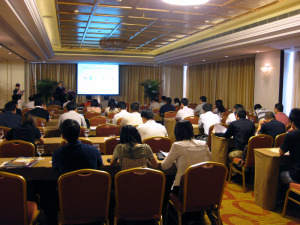David McCormack is an International Trade Specialist in ITA’s Manufacturing and Services unit.
Led by the Acting Deputy Under Secretary of Commerce Ken Hyatt, the U.S. Commerce Department Oil and Gas Trade Mission to Israel introduced 13 companies and 2 universities to the growing oil and gas industry in Israel. The participating organizations included two premier U.S. universities – The University of Texas, Austin and Texas A&M University, Kingsville. Other Delegates included leaders in oil field services, logistics, consulting, data integration, consulting, and manufacturing.
The mission built on excellent trade relations between the countries, including America’s first ever Free Trade Agreement, signed by the U.S. and Israel in 1985. More recently, U.S. Senator, Mary Landrieu brought the first ever oil and gas Certified Trade Mission to Israel in 2011, and the Government of Israel sent an inter-ministerial delegation to the U.S., earlier this year to see extensive energy development firsthand. Finally, on October 24, the US-Israel Joint Economic Development Group (JEDG) met in Washington, chaired by U.S. Treasury Secretary, Tim Geithner, and Israeli Treasury Director-General Doron Cohen. A main topic of discussion was enhanced U.S.-Israel cooperation for natural gas development. As the JEDG signed an agreement that will extend U.S. loan guarantees of $3.8 billion to Israel to 2016, the trade mission to Israel departed for Tel Aviv to explore the histroric opportunities to help build Israel’s new energy economy.
According to a 2010 United States Geological Survey (USGS) assessment, the Eastern Mediterranean contains approximately 122 trillion cubic feet (tcf) of natural gas, with a current market value of $240 billion. Industry representatives also report that they expect to discover oil in these offshore fields. Finally, exploration efforts are also ongoing onshore Israel, creating opportunities for manufacturing, drilling, pipeline installation, etc. Without a developed infrastructure to produce enough of their own energy domestically, Israel has historically been an energy importer. This will not always be the case, and many have recognized that these recent developments represent an energy revolution. Many expect Israel to become a net energy exporter, but right now, extensive infrastructure and devlopment is needed. U.S. companies are ready to deliver.
Hosted in Israel by Senior Commercial Officer Maria Andrews, the trade mission delegates attended the 2012 Israel Energy and Business Convention (IEBC), conducted site visits, attended receptions, participated in a roundtable discussion with Israel’s oil and gas industry, and participated in more than 100 customized business meetings. The official program began at the IEBC, where Hyatt delivered a speech at the opening ceremony, and the U.S delegation was warmly received.
At the roundtable discussion hosted by Hyatt, Senator Mary Landrieu, and the Chair of Israel’s oil and gas association, Uri Aldubi, the delegation received presentations from Noble Energy, Zion Oil, and Genie Energy. Noble briefed the delegation on their discoveries of around 30 trillion cubic feet of gas offshore Israel, and their future hopes for more gas, as well as oil, discoveries. Zion, the largest onshore petroleum exploration leaseholder in Israel, spoke about how to do business in Israel, as a U.S. company, and their optimistic outlook towards Israel’s onshore potential. Finally, Harold Vinegar, from Genie Energy, shared his vision for the development of oil shale in Israel. Vinegar, formerly a Chief Scientist at Shell, stunned the crowd with his estimate of 250 billion barrels of recoverable oil in Israel’s shale deposits. That evening, U.S. Ambassador to Israel, Daniel Shapiro, hosted the delegation at his residence for an exclusive networking reception with the leaders of Israel’s new energy economy.
Thanks to the efforts of the Commercial Service in Tel Aviv, the delegation received a rare and intimate tour of the port of Ashdod, and discussed opportunities in pipeline installation and logistics with port authorities. Keeping a full schedule, they also attended government meetings in Jerusalem, and a high-level presentation and networking session, with industry and government leaders, hosted by the Herzliya Conference, and the Law Firm of Heideman Nudelman & Kalik, a CS Strategic Partner.
While in Israel, Hyatt met with several key government offices, including the Ministry of Energy and Water Resources, the Ministry of Trade, and the Office of the Prime Minister
U.S. Senator Mary Landrieu highlighted the opportunities for academic cooperation between the U.S. and Israel. There are almost no Israeli born petroleum engineers still in Israel. Universities in the Gulf states represent the best programs in petroleum and gas engineering, and specialized energy MBA’s in the world. The 2011 and 2012 Oil and Gas Trade Missions to Israel are laying the groundwork for Israel’s energy industry by bringing advanced petroleum and gas engineering programs to Israel.
The delegates completed the mission feeling optimistic about the commercial opportunities in this sector. The companies realize that doing business in Israel is often a long-term proposition and this will be the first of hopefully many visits to Israel that the companies will make. The U.S. Commercial Service and our Strategic Partners are standing by to assist U.S. firms in accessing the historic opportunities represented by Israel’s energy revolution.










